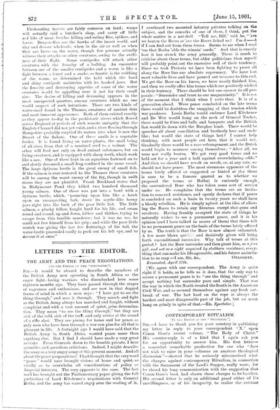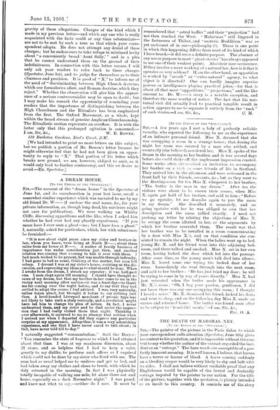CONTEMPORARY RITUALISM.
TO 71IE EDITOR Or THE "SPECTATOR."] SIR, -I have to thank you for your courtesy in' publishing my letter in reply to your correspondent " X." upon Canon Gore's recent volume, " The Body of Christ." His counter-reply is of a kind that I again ask you for an opportunity to answer him. His first letter— a somewhat remarkable production for one who "does not wish to raise in your columns an amateur theological discussion "—showed that he seriously misconceived what the charges against contemporary Ritualism, in connection with the Sacrament of the Lord's Supper, really were ; for he closed his long communication with the suggestion that Canon Gore's book had shown these charges to be baseless. His second letter is only an additional proof either of his unwillingness, or of his incapacity, to realise the extreme
gravity of these allegations. - Charges of the kind which I made in my previous letter—and which any one who is really acquainted with the facts could at any time substantiate— are not to be met by such a tone as that which your corre- spondent adopts. He does not attempt any denial of these charges; but he endeavours to take refuge in mistimed levity about " a conveniently broad ' Aunt Sally,' " and in a plea that he cannot understand them on the ground of their indefiniteness. In connection with this latter excuse, I will only ask your readers to refer back to these charges (Spectator, June 1st), and to judge for themselves as to their clearness and precision. It is good of " X." to inform me of the need of " discriminating between High Church doctrine, which our formularies allow, and Roman doctrine, which they reject." Whether the observation will give him the appear- ance of a serious controversialist may be open to doubt ; but I may make his remark the opportunity of reminding your readers that the importance of distinguishing between the High Churchmen and the Ritualists has been emphasised from the first. The Oxford Movement, as a whole, kept within the broad stream of genuine Anglican Churchmanship. The Ritualistic section represents an overflow. It is with the latter only that this prolonged agitation is concerned.— [We had intended to print no more letters on this subject., but we publish a portion of Mr. Bowen's letter because he might otherwise feel that he had not been given an oppor- tunity to reply to "X." That portion of his letter which breaks new ground, we are, however, obliged to omit, as it would only lead to further controversy, and this we desire to avoids—En. Spectator.]











































 Previous page
Previous page